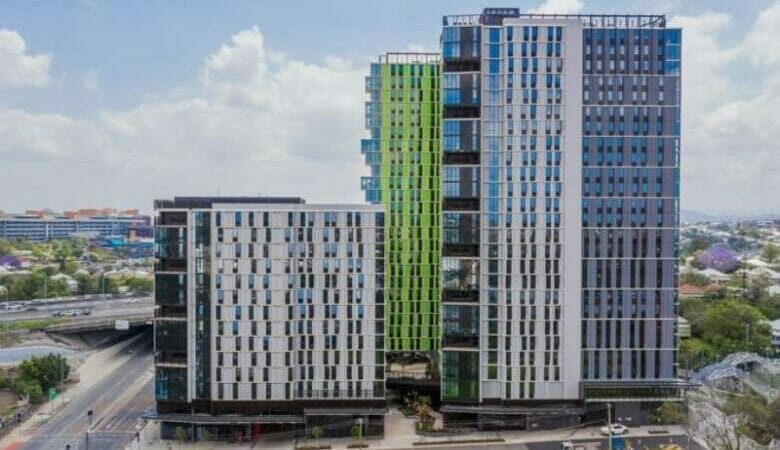
Wee Hur’s Unilodge Park Central in Brisbane is the biggest property in the seven-asset portfolio
A fund managed by SGX-listed real estate investment firm Wee Hur Holdings is selling a nearly half-stake in an Australian student housing portfolio for A$567.86 million ($407.24 million), with market sources identifying the buyer to Mingtiandi as a unit of Singapore’s sovereign wealth fund, GIC.
“We are extremely pleased to have done a recapitalisation of our first Australia focused PBSA (purpose-built student accommodation) fund, providing exit certainty for our investors within the fund term and providing a war chest for the group from the partial recycling of capital should further investment opportunities arise,” Goh Wee Ping, chief executive officer of Wee Hur Capital and the manager of the trust, said in a bourse filing on Friday. “We are also pleased to welcome our new partner and look forward to further partnerships in the future.
Together with its fund investors, Wee Hur has agreed to sell a 49.9 percent stake in a vehicle holding seven purpose-built student accommodation assets spread across Sydney, Melbourne, Brisbane, Adelaide and Canberra to Reco Weather Private Ltd, which was first linked to GIC in a report in the Australian Financial Review.
In response to Mingtiandi’s queries on Monday, Goh said the deal for the 5,662 bed portfolio will mark the second biggest transaction in Australia’s student housing sector to date, with the agreement being announced just over two months after the country removed Covid-19 border restrictions and opened the door for hundreds of thousands of foreign students to return to Aussie universities.
Return of the Students
After Australia’s foreign student population climbed by more than 60 percent from 2011 to reach over 582,000 in 2020, that number has fallen to 422,095 this year after the country’s long lock-down.

Wee Hur Capital CEO Goh Wee Ping
With borders having reopened in late February, Goh says pre-bookings for the second semester of this year, which starts in July, have risen to 90 percent of current capacity, from just 30 percent occupancy at the end of 2021.
Despite the apparent rebound, Wee Hur still expects recovery in the student housing sector to take some time.
“To be clear, it will still take us some time to stabilise our existing portfolio to generate a healthy annual cash flow to ourselves and our partner, and we will keep working on that,” he said. “We are constantly on the lookout with Intergen (the firm’s investment manager in Australia) for further opportunities as our belief in Australia’s export education sector has not changed since we started investing 7 years ago.”
Properties Nearly 90% Occupied
For GIC to gain its slice of the portfolio, which is currently valued at A$1.14 billion, Wee Hur is selling a 9.9 percent stake in WeeHur PBSA Master Trust, an entity which holds the assets, to GIC, which will reduce the company’s holding in the entity to 50.1 percent.
At the same time, a set of investors who hold another 40 percent of the vehicle, said to be mainly members of the Goh family and their associates, are selling the entirety of their ownership.
The transaction is contingent on Wee Hur gaining approval from its shareholders, but also upon completion of the current development portfolio along with the venture establishing 60 percent occupancy in its operational properties. Those conditions are expected to be met in 2023 with completion of the transactions slated to take place before 2024.
The investment by GIC is the largest student housing deal in Australia after student accommodation specialist Scape’s A$2.7 billion purchase of the Urbanest and Atira portfolios in 2019.
Singapore’s $744 billion sovereign fund has demonstrated a taste for student accommodation after joining the Canada Pension Plan Investment Board (CPPIB) and the Scion Group in a $1.1 billion investment in US university housing in 2018. A 50:50 GIC joint venture with Unite Students followed up last year with the £342 million (then $472 million) purchase of a pair of London student accommodation assets.
GIC had not responded to Mingtiandi inquiries regarding this latest transaction by the time of publication.
Seven-Year Plan
Wee Hur began developing the Aussie portfolio in 2015 and had now established three operational purpose-built student housing assets with another four development projects scheduled for completion before the end of 2023.
The biggest operational property in the portfolio is the 1,578-bed Unilodge Park Central in Brisbane, with another Unilodge branded property in Adelaide providing another 772 beds. The venture’s third operational asset is the Y Suites on Waymouth street in Adelaide which has 811 beds.
With the developer having continued to pursue its student housing projects during the pandemic, Wee Hur currently has under construction a 408-bed tower on Regent Street and a 411-bed asset on Margaret Street in Sydney. In Melbourne, the Singapore firm is developing an 888-bed property with another 733-bed asset underway in Canberra. All of the projects are being developed under Wee Hur’s Y Suites brand.
The listed firm also has a second purpose-built student housing vehicle in Australia which controls a Sydney land parcel which is set for development into a 410-bed property.
David Hill, director of alternative investments for JLL Australia, which advised on the deal, said the transaction demonstrates investor confidence in Australia’s student housing segment despite recent challenges of the pandemic.
“International investors are continuing to view the medium and longer term fundamentals as highly attractive, as we expect the Australian market to rebound and return to pre-pandemic growth,” Hill said. “We are already seeing strong numbers in international students returning in 2022, as the recovery commences and demand for Australian education remains high.”
Leave a Reply